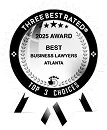 Choosing the proper legal entity is one of the single most important decisions in the infancy of an entrepreneur’s endeavors. It will guide decisions regarding business operations, the exposure to liability of select members, and the rules governing taxation. It is fair to assume that most, if not all, entrepreneurs have a sound foundation in the principles of business. A significant stumbling block for many of these entrepreneurs is navigating the complexities of selecting the correct legal entity for their business in Georgia.
Choosing the proper legal entity is one of the single most important decisions in the infancy of an entrepreneur’s endeavors. It will guide decisions regarding business operations, the exposure to liability of select members, and the rules governing taxation. It is fair to assume that most, if not all, entrepreneurs have a sound foundation in the principles of business. A significant stumbling block for many of these entrepreneurs is navigating the complexities of selecting the correct legal entity for their business in Georgia.
What follows are the most common entities, along with some information about each of them.
Sole Proprietorships in Georgia
A sole proprietorship is the easiest type of business to form. The business typically operates under the owner’s name. There is no formal filing with the State to create this legal entity, and a business and or occupational license is all that is required to begin. While this is the easiest business form to create, it also carries one of the most significant drawbacks.
In a sole proprietorship, personal and business activities are not distinguished, meaning that all income from the business is passed through to the owner or sole proprietor. There is also no shield from liability, meaning that the business owner is personally liable for all debts of the business.
Partnerships in Georgia
Similar to a sole proprietorship, a partnership can be straightforward to form and is merely an agreement regarding a business relationship between two or more people who join to carry on a trade or business. Where a sole proprietorship has a single owner and decision holder, a partnership has at a minimum two members who are responsible for carrying on the business. These partners contribute capital, labor, or skill to the organization and, in return, share in the profits and losses.
Generally, a partnership entails unlimited liability and pass-through taxation, with some exceptions. While a formal, written partnership agreement is not necessary to create a partnership in Georgia, it is strongly recommended.
C – Corporations in Georgia
A C corporation (“C corp”) is a separate legal entity from its owners, unlike a sole proprietorship or partnership. Because the corporation is separate from its owners, personal assets are generally protected from the business’s liabilities.
The main drawback is its complexity. Profits are taxed twice: once at the corporate level and again when distributed to shareholders.
Shareholders own the corporation and elect a board of directors to make major decisions and set policies. The board can then appoint officers to run the day-to-day operations. In many startups and small businesses, it is common for the same people to serve as shareholders, directors, and officers.
S – Corporations in Georgia
An S corporation begins with the same structure as a C corporation but makes a special tax election that alters its tax treatment.
With S corp status, the company’s income and expenses “pass through” to the owners’ personal tax returns. This avoids the double taxation that applies to C corps. Like a C corp, an S corp also provides liability protection, generally keeping the owners’ personal assets separate from the business. However, not every business qualifies to be an S corp.
Limited Liability Companies in Georgia
A limited liability company (“LLC”) is a hybrid entity that combines the limited liability characteristics of a corporation with the tax structure of a partnership.
While requiring more steps to create than a sole proprietorship or partnership, an LLC enjoys the same flexibility that these entities share regarding pass-through taxation and ease of ownership.
LLCs offer business owners the same liability protection as corporations, but without the burdens of double taxation, mandatory shareholder meetings, complex decision-making structures, or stock management. That flexibility is why LLCs are one of the most popular business structures for small business owners in the state of Georgia.
Speak with an Experienced Georgia Business Attorney Today
An experienced Georgia business attorney can help evaluate, form, or manage your Georgia small business or startup. To learn more about how we can assist you in starting your business, contact Thrift McLemore at info@thriftlegal.com or (678) 882-0830.






